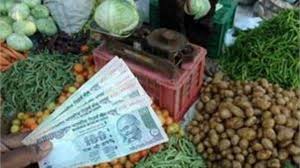Softer price rise in food articles, especially onion and vegetables
India’s wholesale inflation slowed to 2.26% in February on the back of softer price increase in food articles, especially onion and vegetables, data released by the commerce and industry ministry showed on Monday.
Wholesale price inflation was 3.1% in January. Annual inflation, based on monthly wholesale price index (WPI), was 2.93% in February 2018. Inflation in onions was 162.3% last month, while that in vegetables was 29.97%. Overall in food articles, it eased to 7.79% from 11.51% in January.
“An expected decline in the prices of crude oil and various commodities, the pass-through of the same to core-WPI, and a continued correction in prices of some vegetables, would result in the WPI inflation declining to sub-1% in March,” ICRA principal economist Aditi Nayar said. Core WPI was negative 0.8% last month.
However, protein-rich items showed accelerated inflation at 4.48% in milk and 6.88% in eggs, meat and fish, compared with 3.7% and 6.73%, respectively, in January.
“Inflation is headed downwards on lower demand for chicken and eggs due to the coronavirus, along with a slowdown in manufacturing. Due to a decline in commodity and oil prices, we expect a further dip in inflation,” said DK Joshi, the chief economist at Crisil.
In manufactured products, which have a 64.23% weight in the index, the inflation was 0.42%. In fuel and power, it was 3.38%.
“We expect wholesale inflation to average around 1.5-2% for the fiscal,” CARE Ratings chief economist Madan Sabnavis said.
Official data released last week showed India’s retail inflation rate slowing to 6.58% in February from 7.59% in January on softer food inflation.
This, as per Nayar, suggested a high likelihood of a rate cut in the next policy meeting. While that would bolster sentiment to some extent, modest transmission may result in a feeble impact on growth, she said.
“The higher duties on petrol and diesel will help to shore up government revenues, while preventing a sharper easing in inflationary pressures,” she said.

